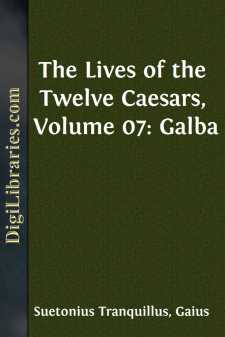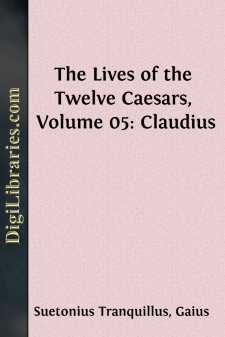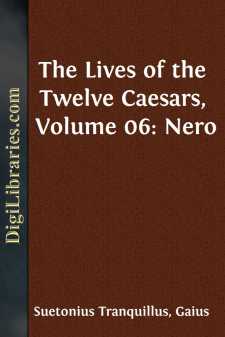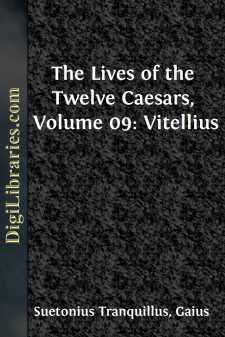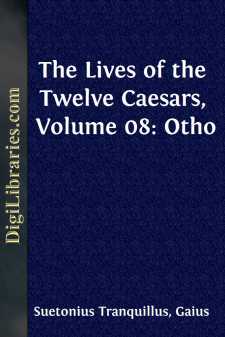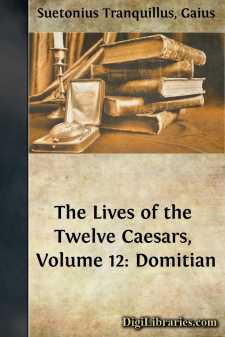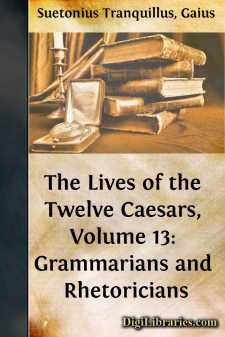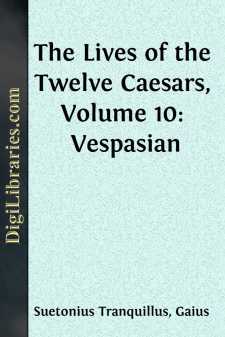Fiction
- Action & Adventure 180
- Biographical 15
- Christian 59
- Classics
- Coming of Age 5
- Contemporary Women 3
- Erotica 8
- Espionage/Intrigue 12
- Fairy Tales, Folklore & Mythology 236
- Family Life 169
- Fantasy 117
- Gay 1
- General 596
- Ghost 32
- Historical 808
- Horror 43
- Humorous 160
- Jewish 25
- Legal 4
- Medical 22
- Mystery & Detective 315
- Political 49
- Psychological 41
- Religious 64
- Romance 159
- Sagas 11
- Science Fiction 730
- Sea Stories 113
- Short Stories (single author) 537
- Sports 10
- Suspense 1
- Technological 8
- Thrillers 2
- Urban Life 31
- Visionary & Metaphysical 1
- War & Military 173
- Westerns 199
Classics Books
Sort by:
SERGIUS SULPICIUS GALBA. (400) I. The race of the Caesars became extinct in Nero; an event prognosticated by various signs, two of which were particularly significant. Formerly, when Livia, after her marriage with Augustus, was making a visit to her villa at Veii [639], an eagle flying by, let drop upon her lap a hen, with a sprig of laurel in her mouth, just as she had seized it. Livia gave orders to...
more...
I. Livia, having married Augustus when she was pregnant, was within three months afterwards delivered of Drusus, the father of Claudius Caesar, who had at first the praenomen of Decimus, but afterwards that of Nero; and it was suspected that he was begotten in adultery by his father-in-law. The following verse, however, was immediately in every one's mouth: Tois eutychousi kai primaena paidia....
more...
NERO CLAUDIUS CAESAR. (337) I. Two celebrated families, the Calvini and Aenobarbi, sprung from the race of the Domitii. The Aenobarbi derive both their extraction and their cognomen from one Lucius Domitius, of whom we have this tradition: —As he was returning out of the country to Rome, he was met by two young men of a most august appearance, who desired him to announce to the senate and people a...
more...
§ 1. THE TERM The names ‘rationalist’ and ‘rationalism’ have been used in so many senses within the past three hundred years that they cannot be said to stand quite definitely for any type or school of philosophic thought. For Bacon, a ‘rationalist’ or rationalis was a physician with a priori views of disease and bodily function; and the Aristotelian humanists of the Helmstadt school were...
more...
AULUS VITELLIUS. (427) I. Very different accounts are given of the origin of the Vitellian family. Some describe it as ancient and noble, others as recent and obscure, nay, extremely mean. I am inclined to think, that these several representations have been made by the flatterers and detractors of Vitellius, after he became emperor, unless the fortunes of the family varied before. There is extant a...
more...
A. SALVIUS OTHO. (416) I. The ancestors of Otho were originally of the town of Ferentum, of an ancient and honourable family, and, indeed, one of the most considerable in Etruria. His grandfather, M. Salvius Otho (whose father was a Roman knight, but his mother of mean extraction, for it is not certain whether she was free-born), by the favour of Livia Augusta, in whose house he had his education, was...
more...
TITUS FLAVIUS DOMITIANUS. (479) I. Domitian was born upon the ninth of the calends of November [24th October] [795], when his father was consul elect, (being to enter upon his office the month following,) in the sixth region of the city, at the Pomegranate [796], in the house which he afterwards converted into a temple of the Flavian family. He is said to have spent the time of his youth in so much...
more...
by:
John York Cabot
This little guy Stoddard was one of the toughest customers I'd ever done business with. To look at him you'd think he was typical of the mild pleasant little sort of suburban home owner who caught the eight-oh-two six days a week and watered the lawn on the seventh. Physically, his appearance was completely that of the inconspicuous average citizen. Baldish, fortiesh, bespectacled, with the...
more...
LIVES OF EMINENT GRAMMARIANS (506) I. The science of grammar [842] was in ancient times far from being in vogue at Rome; indeed, it was of little use in a rude state of society, when the people were engaged in constant wars, and had not much time to bestow on the cultivation of the liberal arts [843]. At the outset, its pretensions were very slender, for the earliest men of learning, who were both...
more...
T. FLAVIUS VESPASIANUS AUGUSTUS. (441) I. The empire, which had been long thrown into a disturbed and unsetted state, by the rebellion and violent death of its three last rulers, was at length restored to peace and security by the Flavian family, whose descent was indeed obscure, and which boasted no ancestral honours; but the public had no cause to regret its elevation; though it is acknowledged that...
more...


